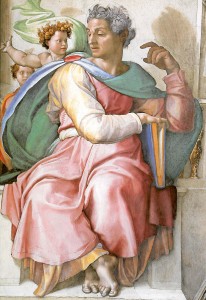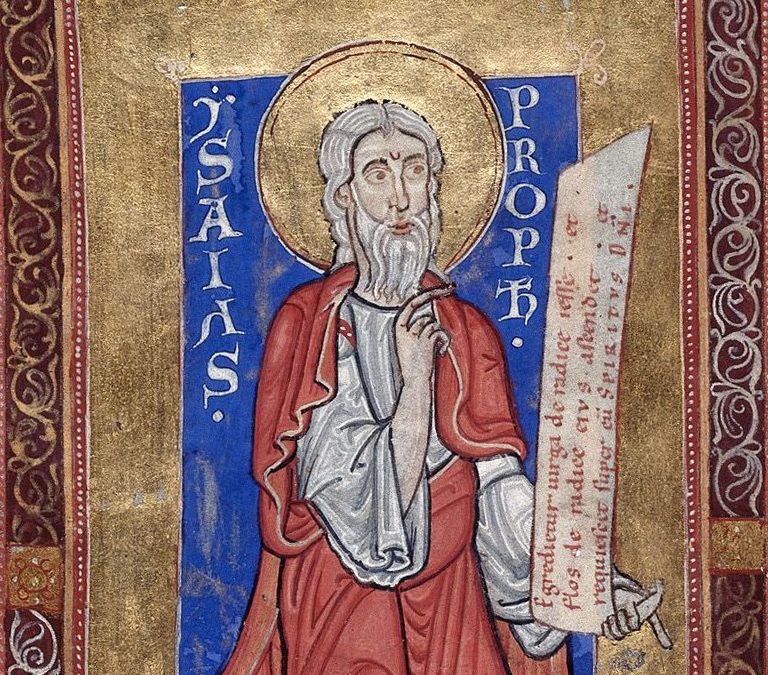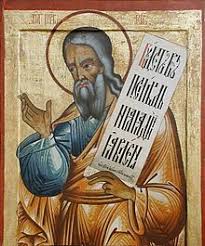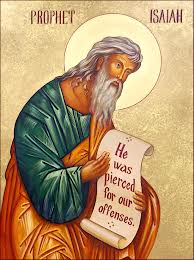 The Prophet Isaiah lived nearly 700 years before the birth of Jesus. He genealogy names him as part of a royal lineage. We know from biblical study that Isaiah’s father Amos raised his son in the fear of God and in the law of the Lord. Isaiah weds the pious prophetess (Is 8:3) and had a son Jashub (Is 8:18).
The Prophet Isaiah lived nearly 700 years before the birth of Jesus. He genealogy names him as part of a royal lineage. We know from biblical study that Isaiah’s father Amos raised his son in the fear of God and in the law of the Lord. Isaiah weds the pious prophetess (Is 8:3) and had a son Jashub (Is 8:18).
God called Isaiah into His prophetic service during the reign of Uzziah, king of Judea, and he prophesied for 60 years during the reign of kings Joatham, Ahaz, Hezekiah and Manasseh. The start of his service was marked by the following vision: he beheld the Lord God, sitting in a majestic heavenly temple upon a high throne. Six-winged Seraphim encircled Him. With two wings they covered their faces, and with two wings they covered their feet, and with two wings they flew about crying out one to another, “Holy, Holy, Holy Lord Sabaoth, heaven and earth are filled with His glory!” The pillars of the heavenly temple shook from their shouts, and in the temple arose the smoke of incense.
Several important things are instructive for us today:
“Oh, an accursed man am I, granted to behold the Lord Sabaoth, and having impure lips and living amidst an impure people!” A Seraphim (one of the angels) was sent to him having in hand a red-hot coal, which he took with tongs from the altar of the Lord. He touched it to the mouth of the Prophet Isaiah and said, “Lo, this has touched thy lips, and will take away with thine iniquities, and will cleanse thy sins.” After this Isaiah heard the voice of the Lord, directed towards him, “Whom shall I send, and who will go to this people?” Isaiah answered, “Here am I, send me” (Is 6:1 ff).
Prophets announced to the people the consequences of their sin; denounces the Jews for their unfaithfulness to God and they call them back to relationship with God through the observance of the law and tradition. For example: turn from impiety and idol worship; repent.
Famously, Isaiah predicted the captivity of the Jewish people and their eventual return during the time of the emperor Cyrus (a pagan but seen as a messiah), the destruction and renewal of Jerusalem and of the Temple; predicts the historical fate also of the other nations bordering the Jews; and with clarity and certainty spoke of the coming of the Messiah, Jesus, the Christ as the Savior.
Christians rely on Isaiah because it is his vision and that we come to accept the birth of the Messiah from a Virgin, and the work of the Messiah: the Suffering of the Messiah for the sins of the world and resurrection
Isaiah died a martyr. King Manasseh him killed by a wood-saw. Initially, he was buried not far from the Pool of Siloam. In time, the relics of holy Isaiah transferred by the emperor Theodosius the Younger to Constantinople located in the church of Saint Laurence, Blachernae. Presently, the Hilandar monastery on Mount Athos has a portion of the prophet’s skull.




